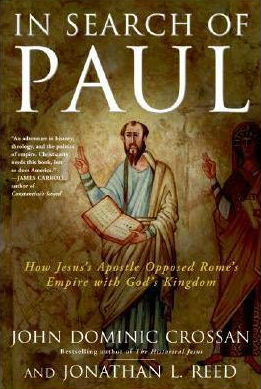Election Prep: St. Paul At the Ballot Box: What to Think About and Why!
By Neil Earle

As November 6 dawns in an imprortant election some want to groan.
No wonder after all we have been through in media this past year. So what to do?
Thankfully the hard-driving and politically astute St. Paul (see how he handled “interest groups” while on trial in Acts 23) was never shy to tell us what to think about and why on any and all occasions.
As a target of incessant hostility, persecution and eventual martydom he had “street cred” in helping Christian navigate tough times…and all times. Here are his eight prescriptions for a successful life going beyond mere survival.
They’re found in Philippians 4:8 (quoting mostly from the New King James Version).
True Blue Dependability
“Whatever things are true…” gets us started. The word for “true” in the Greek is close to “alethea,” hence the woman’s name “Alethea.” It means something solid and dependable, anything which will never let us down in this world bombarding us with twitters and tweets and roller coaster news cycles. Is there anything solid we can depend upon? Think about it – what is there in your life that has been rock-solid? Paul says that this is a good subject for meditation as we go about our daily lives.
My mother fits this description. Over 90 years of busy life as a music teacher, church organist, choir leader she still retained a strong affection for the underdog wherever she met them. Once when someone was criticizing a food dish left by a poor woman down the road for a church function, mom sprang to her defense like the true-blue kindly and intelligent woman she was. “Whatever is true.” Can you think of other people you know who were or are like that? Sure you can. All is not lost. Meditate upon this and it will do your heart good.
 A "Now" Book: First Century politics permeated the Apostles' ministries giving us valuable advice for today.
A "Now" Book: First Century politics permeated the Apostles' ministries giving us valuable advice for today.Next: Number Two: “Whatever things are noble…” The word refers to anything that inspires lofty, majestic thought. This may be a bit harder for us ordinary everyday people to conjure up in our day-to-day lives but majestic and lofty could mean things such as the Rocky Mountains or the Empire State Building, the Northern Lights or a day in the great outdoors. Or the remembrance of a truly worthy deed we hear about from time to time.
The Bible is full of such noble case histories. Saul, the first king of Israel, had turned into a paranoid schizophrenic trying to kill his imagined rival, the warrior David. But when Saul died fighting Israel’s enemies David chose to forget the bad and remember the good and composed the most famous lament in history. “Saul and Jonathan were lovely and pleasant in their lives…they were swifter than eagles, they were stronger than lions” (2 Samuel 1:23). David chose to remember the good about his most dangerous enemy. This characteristic empathy suffused the mental posture of the king whom God called “a man after his own heart.” A man of true nobility and one other people could follow. And did.
We still sing his songs today. What an example!
“Duty faced, Duty done”
“Whatever things are just…” We usually think of this word as meaning “fair play” or legal equity but the Bible uses it more in the same way we use the word “righteous,” “right standards,” “right dealings.” Barclay writes: “The word is dikaios and the Greeks defined the man who is dikaios as he who gives to gods and men what is their due. In other words dikaios is the word of duty faced and duty done.” Joseph – one of the unsung heroes of the Christmas story – was Jesus’ foster-father and husband of Mary. He is praised as a just man (Matthew 1:19). Remember how he wanted to treat Mary his pregnant fiancée fairly in spite of the social embarrassment inherent in her hard-to-explain pregnancy. This devotion to duty reveals the solid and steady character of the kind the world often overlooks. Joseph is a key figure in the events of Christmas.
Similarily, the elderly patriarch Simeon was considered “just and devout” and he was chosen by the Holy Spirit to announce the infant Jesus as the long-awaited Messiah to visitors at the Jewish temple in Jerusalem (Luke 2). Here again the connotation of having a righteous duty to perform and seeing it through is a key to godly character.
To be “just” is to be like God and especially is it applied in the sense of having being faithful over time. Good deeds are immensely better than good words and the Christians in Philippi knew this was a trait their pagan neighbors valued highly
People Who Imspired Jesus
“Whatever is pure.” Hmm. That might seem a bit lofty and out of reach. We well know we are sinners who are always falling short. But Jesus explained it was possible to be “pure in heart” – that is, our attitudes and goals and intention at least can be pure. Pure in attitude meaning people no harm – that is a trait to highly prize. Campaign ads can be so destructive but the pure in heart, Jesus added, will get to see God.
Jesus prized the attitude of blunt Nathanael and zealous Zacchaeus and studious Mary of Bethany. Nathaniel was tactless but Jesus saw his heart (John 1:43-51). The whole city of Jericho hated the scrawny little tax collector Zacchaeus, but Jesus knew there was more to him (Luke 19:1-10¬). Mary chose listening to the Master rather than being busy fussing with “women’s things” (John 12:1-8). Jesus loved the pure in heart. Continually on his journeys there were people who inspired him, people who meant business, who prized truth and wanted to hear more of it. The pure in heart are fervent, single-minded seekers trying to do the right thing. Ask if there are any candidates running who are like that, or who are at least trying.
 Few faced more corrupt politics than the falsely accused St. Paul. (Wikipedia)
Few faced more corrupt politics than the falsely accused St. Paul. (Wikipedia)“Whatever is lovely.” This is the only place this word is mentioned in the Greek New Testament It carries the meaning of anything pleasing or attractive. It’s been said that when we admire a great painting or a well-performed piece of music or a thrilling feat in baseball or other sports, it reveals more about us than the object. It shows we are willing to believe in good things, in excellence. When the town prostitute washed Jesus’ feet with her hair or when Mary was criticized for pouring an expensive bottle of alabaster upon his head – anointing him in advance for his burial &dnash; their single-minded devotion and purity of heart shone through. Those were lovely gestures – things worthy of admiration like a beautiful painting.
People who are pure in heart may not stand out in the crowd but they will ultimately be recognized for their inner life, their heart’s private devotion, even though they don’t seek out fame or acclamation.
Lavish with His Praise
“Whatever is praiseworthy…” Oh how stingy we moderns are about giving praise and appreciation. It seems we let this calloused world encase us in a shell of hardheartedness. Praising God or another human being, however, is highly therapeutic. It brings us out of ourselves. It unleashes positive enzymes and unlocks a flow of good feelings and generosity we’d forgotten we had. When we admire a great athlete or a good deed performed with no strings attached it is we ourselves who are blessed. It is like Shakespeare explained about mercy: “It is twice blessed; it blesses him that gives and him that takes…it is an attribute of God himself.”
The ability to praise noble effort shows we possess empathy, a capacity for recognizing the good in others and improving the moral tone around us. Paul often praised his churches. The Corinthians were singled out for their giftedness, the Thessalonians for their faithfulness under persecution and the Philippians for their generosity. Jesus often doled out generous praise to his loyal associates: “Blessed are you Simon bar-Jonah,” “Oh, woman, great is your faith” or “I have not found such faith in Israel." Prasie is contagious – it comes back on you. Try it, you’ll like it.
For Christians, Jesus sets the standard for praiseworthiness in a day and age when savage criticism and sneering disapproval and questioning motives is often the norm. Bad television was one thing but the new social media is something more formidable indeed and its misuse as bullying has driven people to their death. Handle these tools wisely, avoid the trap, the curse of negativism. We simply cannot let the world rub off on us like that.
Going On to Excellence
Paul’s great eight end with a summary appeal to his converts to highly value anything excellent or praiseworthy. Excellence or arête was almost the cardinal Greek virtue. It usually referred to excellence in the games, or in war or in letters or philosophy. Greek history was pervaded with it – whether the heroic resistance of the 300 Spartans at Thermopylae or the willingness of Socrates to die for his principles. Paul uses arête here only once but it was so very relevant to his hearers who lived in Greek cities.
In Philippians 4:8, then, Paul summons his people to be the very best they can be, as we say today. “Draw upon the best of your past and present.” Become that "living sacrifice" Paul urged us to be in servitude to godly excellence of character (Romans 12:1). The light we shine may help spread even more the hopeful message of salvation to a darkening world amidst so much despair. This will make us “praiseworthy” before God and men, as was Jesus. It will help keep us in God’s grace as his ambassadors of peace, wholeness and holiness. We are called by the Gospel to live in such a way as to summon forth the best results from those around us, in spite of our own manifold sins and weaknesses.
Paul’s great eight are almost a mini-curriculum in Christian living, as true and relevant and as worth our attention today as when they were first written. So, that’s what we need to think about this November, and all times.